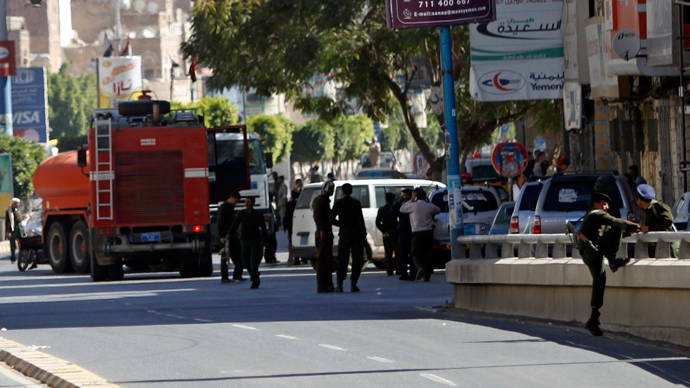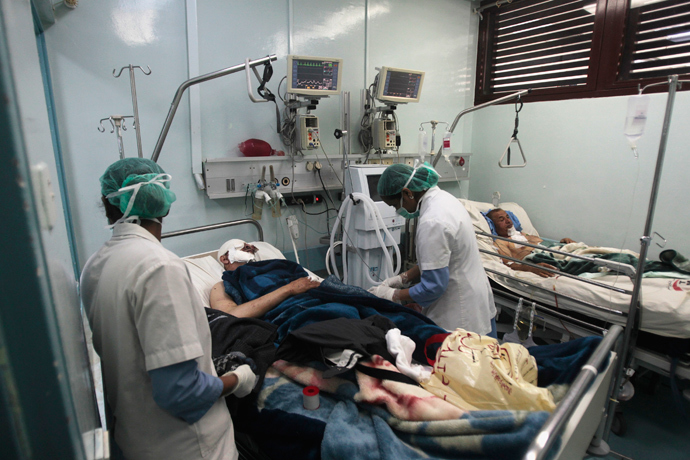Yemen too unstable now, 'we have to sit back and wait’

The bombing of Yemen’s Defense Ministry that claimed 52 lives is being widely blamed on Al-Qaeda. But retired US Army Colonel Douglas McGregor believes that the volatile tribal country’s fragile government could also harbor many secrets.
Moreover, the situation is not helped by the region’s dwindling
natural resources, let alone other, wider, conflicts, McGregor
told RT.
RT: So, a very well-coordinated terrorist attack
against the military in the heart of the country's main city.
What does that says about the strength of the insurgents in Yemen
today?
Douglas McGregor: It’s hard to gauge the strength. You
have to remember, Yemen is a very backward tribal state – there
are very many different factions and it’s a place for Al-Qaeda to
gain easy access, so this bears the hallmarks of Al-Qaeda. How
widespread it is, is difficult to ascertain.
RT: Pictures of the aftermath show hospital beds
surrounded with blood. What were the attackers trying to achieve
by attacking such vulnerable people?
DM: You have a Sunni-Shiite civil war unfolding
in that part of the world, already in the Arabian Peninsula.
Secondly, the borders are porous, there’s really no border
control, it’s not a sovereign state in the sense that we think of
it in the Westphalian context, so you’re talking about a tribal
state: different sects of Islam opposed to each other, different
tribes opposed to each other, everyone jockeying and maneuvering
for power and influence. The government is extremely weak, almost
to the point of being irrelevant. So under these circumstances,
this is the perfect place for Al-Qaeda to sink its roots.

RT: Many have said the attack bears the hallmarks of Al-Qaeda, but one Yemeni Minister points toward people linked to the former government. Who do you think is to blame?
DM: That’s entirely possible. No one has yet
claimed responsibility. The reason that many of us are simply
saying ‘It looks like Al-Qaeda’ is that we’ve seen this before
with Al-Qaeda, we’ve seen attacks like this in Afghanistan, in
north-west Pakistan and, frankly, recently in Iraq, where
Al-Qaeda is operating very successfully against the Shiite
Islamic government in Baghdad.
RT: What are the key factors contributing to the
country's instability right now?
DM: Well, I think the attack didn’t quite come
off as originally hoped. The plan was to actually kill senior
military officers that were supposed to have a meeting at the
location at about the time the attack occurred. As it turns out,
the meeting was postponed, the officers didn’t show up. So they
ended up killing people that were largely irrelevant to them and
losing people in the process. But I think what this tells us is
that you’ve got a government, which has lots of people in it who
are, frankly speaking, either sympathetic to Al-Qaeda or simply
corrupt and can be bought off. So information was on hand that
they plan to exploit. The government is lucky it didn’t lose most
of its senior military leadership.
RT: If there is indeed a conflict between the remnants
of the old regime and the new government, how serious might this
get?
DM: When we say ‘serious’, what does that mean? The
place is not going to become stable anytime soon. Remember that
when the British established themselves there many years ago in
Aden, they limited their interest to the poor. They certainly
didn’t penetrate the back country, it was not worth their time,
or interest – I’m not sure it’s worth our time or interest. We
can’t manipulate the people on the ground over there. We’ve
tried. It hasn’t worked very well. We’ve launched lots of drone
strikes, killed lots of people. It doesn’t seem to have cured the
disease. So I think we’re just going to have to sit back and
wait. People there are going to fight it out. We hope that
whoever emerges victorious is someone we could work with or deal
with.
RT: Are there any external influences that are inflaming
Yemen?
DM: I think things are going to continue to
deteriorate; we’re going to see more attacks like this, more
instability, and more disorder. And remember, here’s something
else – it seldom comes up in discussion: this place is running
out of water, like much of the Middle East. The whole Saudi
peninsula is in trouble. If you’re running out of water, what
does that suggest for your future in the region? Unless you can
build desalinization plants, which takes a lot of money and a
great deal of investment, you are in trouble. And their oil and
gas infrastructure is very small and running into trouble,
they’re not pulling much out.
The statements, views and opinions expressed in this column are solely those of the author and do not necessarily represent those of RT.
The statements, views and opinions expressed in this column are solely those of the author and do not necessarily represent those of RT.












